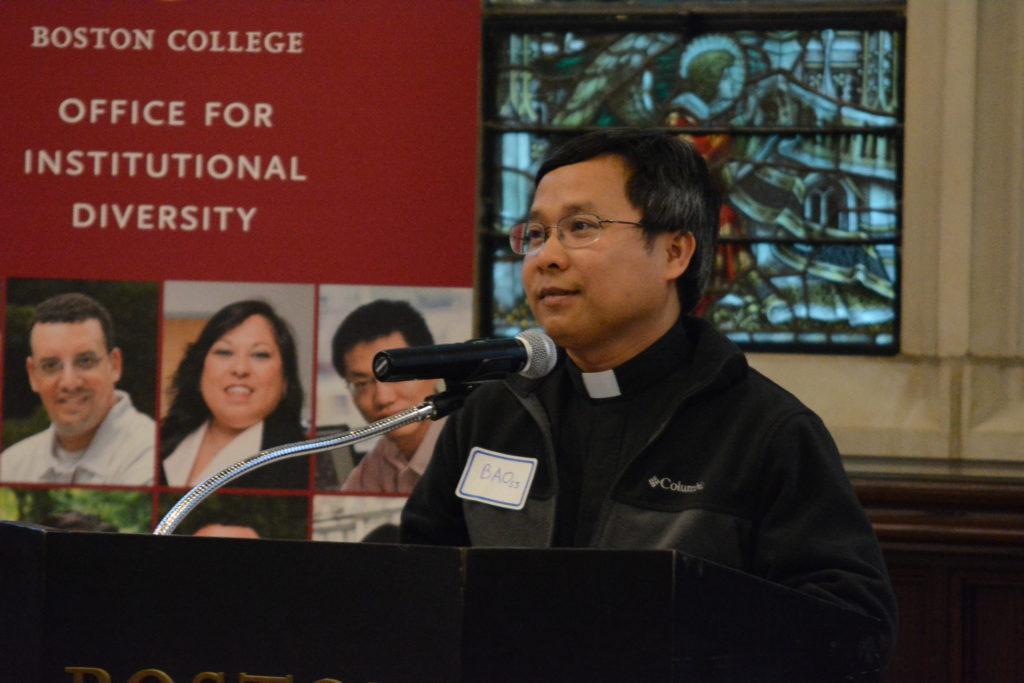The number of Jesuits living at Boston College has decreased by about 100 since 1965. The trend of a declining Jesuit population seems to be true in other parts of the world, including Puerto Rico and Australia.
On Wednesday evening, a panel of four Jesuits from BC joined members of the community in Gasson 100 to discuss the global diminishing numbers of Jesuits in society and the adversities that Catholicism faces in the United States, Puerto Rico, Australia, and Vietnam.
As part of the Office for Institutional Diversity’s “Living Out the Jesuit Mission” panels, Rev. Robert Keane, S.J.; Rev. Juan Carlos Rivera; Rev. S.J., Ramesh Richards, S.J.; and Rev. Bao Nguyen, S.J., each briefly spoke of the challenges and hopes Jesuits face in the 21st century.
“Today, there is a desperate shortage of priests … this is not unique to Jesuits, it’s a phenomenon for religious orders in the United States and throughout the world,” Keane said.
Keane said that there are currently 2,150 Jesuits in the U.S. today. Yet, 81 Jesuits passed away last year, and only 35 entered priesthood. While North America used to have 10 religious provinces, that number has since diminished to five, and is soon to be four.
Keane also mentioned that in 1965, 149 Jesuits lived in St. Mary’s Hall. In 2000, that number dropped slightly to 130 Jesuits. Today, there are only 50 Jesuits in St. Mary’s.
“So when people say, ‘well why can’t we get more Jesuits?’ There’s the answer. There just aren’t any more Jesuits … We wish we had more, but we don’t,” Keane said.
Rivera, who is from Puerto Rico, spoke next about the hardships citizens and Jesuits face in Puerto Rico. He has been in the Society of Jesus, the religious congregation of the Jesuit speakers, for 13 years and is the youngest Jesuit at BC, offering a perspective closer to that of the students studying here today.
“The best time of my life was when I was teaching the juniors and the seniors philosophy,” he said. “I was free to teach whatever I wanted and I was so happy. It was definitely something that made me decide I wanted to pursue this more in the future.”
Rivera also talked about challenges in Puerto Rico that the citizens, as well as the Society of Jesus, have faced since he left. He explained that today there are more Puerto Ricans in the continental U.S. than in actual Puerto Rico, with the disparities only increasing.
“Every single year, more and more schools are closed, because there are no kids, at all,” he said. “It’s not just that Puerto Ricans are leaving, it’s also that Puerto Ricans are just not having kids. So that’s a huge problem.”
The recent humanitarian crisis in Puerto Rico due to Hurricane Irma did not help the situation. Rivera spoke about the need for Jesuits, the country, and the island to work together to fight the challenging and complicated rebuilding efforts.
Richards spoke about the difficulties for Jesuits to reach out to young people in Australia. Richards, a Jesuit of Indian background who grew up in Malaysia, moved to Australia at 18 to pursue a higher education. Because he was Christian, there was a slim chance he would be accepted to a university in Malaysia. At age 25, Richards joined the Society of Jesus, and is currently the youngest vowed Jesuit in Australia.
Richards said it is nearly impossible to connect with students after they leave high school because there are no Jesuit universities in Australia. Like Keane and Rivera, Richards noted the lack of younger Jesuits joining the Society of Jesus. He said that the average age of Jesuits in Australia is 65 years old.
“The average has actually been falling, not because young people are joining, but because older guys are dying, and quite quickly,” Richards said.
In the last five years, the amount of people who identify as Catholic in Australia has decreased from 25 percent to 22 percent, after years of staying at a steady 25 percent. Richards shared with the audience that he sadly believes this number will decrease even more in the next five years.
Nguyen discussed the prevalence of Catholics and Jesuits in his home country, Vietnam. Catholics are challenged by harsh government restrictions on religious freedom. According to Nguyen, Vietnam lacks Catholic schools, hospitals, and social services. Until 2010, there were no Catholic universities.
However, in contrast to patterns in the U.S., Puerto Rico, and Australia, Vietnam is experiencing a trend of an increasing number of Jesuits.
“If you look at the status of the society, 76 percent of the entire province [who] are in the years of formation are 40 years old or younger,” Nguyen said. “This is a blessing for the Society, and also for the Church, as well as Vietnam.”
Although most of the discussion focused on the disheartening decline of Jesuits in today’s society, the increasing number of Jesuits in Vietnam and the continuation of Jesuit institutions like BC ultimately offered a feeling of hope.
“People have a good heart and want to contribute back to society,” Richards said. “They might not identify with institutional church, but they still believe in humanity.”
Featured Image by Delaney Vorwick / Heights Staff













